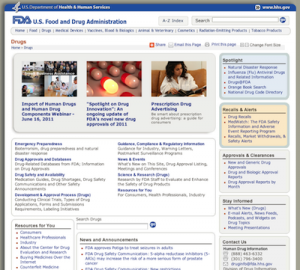 FDA’s Center for Drug Evaluation and Research (“CDER”) is establishing a new office, which in part will focus on drug importations. This move highlights CDER’s increased involvement in determining the compliance of individual drug-shipments imported into the United States. Also, this new office may likely centralize admissibility decisions, leaving the FDA field offices (and importers) waiting for decisions on drug entries. These affects will cause drug-importers greater delays in importing their products and could exacerbate drug shortage problems. Also, they will create incentive for different FDA offices to point the finger at the other for causing the longer delays.
FDA’s Center for Drug Evaluation and Research (“CDER”) is establishing a new office, which in part will focus on drug importations. This move highlights CDER’s increased involvement in determining the compliance of individual drug-shipments imported into the United States. Also, this new office may likely centralize admissibility decisions, leaving the FDA field offices (and importers) waiting for decisions on drug entries. These affects will cause drug-importers greater delays in importing their products and could exacerbate drug shortage problems. Also, they will create incentive for different FDA offices to point the finger at the other for causing the longer delays.
CDER opted to re-organize the Office of Compliance into a “Super Office”. Under this new Super Office, CDER will create four new offices (three of which mirror the current divisions). By-and-large, this reorganization simply amounts to reshuffling the cards (or rearranging chairs on the Titanic). The new office, named the Office of Drug Security, Integrity & Recalls (“ODSIR”), will include a Division of Import Operations & Recalls. Among other assignments, ODSIR is tasked to take the lead in handling import operations.
Frankly, we thought FDA already had a Division of Import Operations and Policies — but apparently they need another one, or perhaps a “super-duper” one. This reorganization cements CDER’s continuing and increased involvement in reviewing the compliance of individual imported articles – a process that already takes months if CDER gets involved. One wonders what the District compliance officers will be doing if a centralized headquarters office, with little to no experience in dealing with the fast paced environment of moving imported cargo, must make the compliance decisions.
Already when the Districts refer an entry (an imported shipment) to CDER for review, the District simply repeats the Center’s words. CDER hides behind the District compliance officer, directing all substantive inquiries to the field – so much for transparency, reducing duplication, and empowering the field to make reasoned decisions to keep trade moving.
Centralized government regulation does not work – it never has. And when centralization meets international trade, international trade suffers, and so do businesses and consumers.
We predict this will cost more money, delay more cargo, eventually increase drug shortages and damage international trade. But, we will be able to call a super compliance officer in a super CDER office and get referred to a field compliance officer, who will be waiting for a decision just like us.
– Benjamin L. England, Founder

